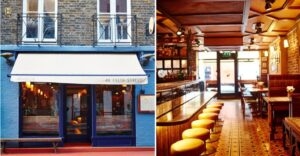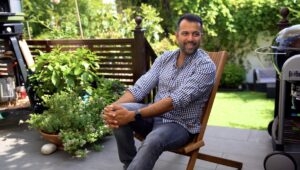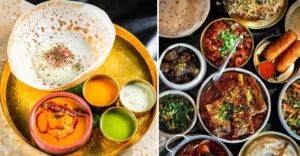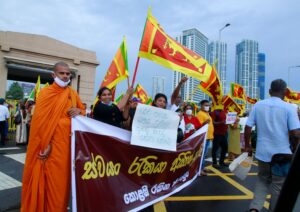Interview
South Asian Heritage Month: Hoppers’ Karan Gokani on spurring on London’s love affair with Sri Lankan food
16 Aug 2022
5m
When Hoppers landed in London’s Soho in 2015, there wasn’t anywhere else like it. Named after a popular Sri Lankan breakfast dish, the restaurant was a welcoming but trendy homage to South Indian and Sri Lankan food – and the capital lapped it up.
With a cosy interior, featuring warm terracotta tiles and a rattan ceiling, Hoppers’ very first Soho branch seated just fourty, and sold a menu packed with dosas, hoppers, kothus, and roasts. They were all dishes Karan Gokani had grown to love, and “selfishly” wanted closer to his doorstep.
“When I came to this country for the first time in 2005, you had to travel out to areas like Wembley or Tooting [to eat South Indian or Sri Lankan food],” the restaurant’s co-founder tells Twisted. “It wasn’t really about a gap in the market, it was more a selfish motive. We wanted to create a place where we could go and eat it all the time.”

Hoppers Soho opened in 2015 (Credit: Instagram/ Hoppers)
Whatever their intentions, a gap in the market is certainly what Karan found. From the first week, there were queues stretching around the block – and seven years later, these remain at the Hoppers in Soho and its newer siblings in Kings Cross and Marylebone, too.
The restaurateur says it speaks to the fact that “people want regional Asian food today, rather than just a generic curry.”
“For one, Bangladeshi food is seeing a bit more of a revival beyond the curry house, and there’s Nepalese food coming on the scene now, too,” he says.
“There’s an understanding that the food is actually very different between Sri Lanka, regions of South India and the west, east and north.”
Karan’s own childhood is testament to this. Growing up in Mumbai, on the west coast of India, he was raised on Bombay and Gujarati food, and the Sri Lankan dishes you’d see at Hoppers were mostly foreign to him throughout his childhood.
Despite this, he says some of his most formative culinary memories are of South Asian cookery.

Karan Gokani spoke exclusively to Twisted (Credit: Twisted)
“My uncle (I call him that although he’s actually a very close family friend)… he’s Tamilian in origin, and he was one of the most amazing people I’ve ever known, and one of the biggest influences in my life,” the Hoppers founder reflects.
“He would come round randomly with a bag of ingredients you can’t get in our normal stores, and he’d cook food from Tamil Nadu a little bit from Kerala, because he travelled around a lot.
“I just remember him laughing in the kitchen with my cook. They’d put together, you know, nine dishes, and then there would be this huge spread on the dinner table.”
Some of the meals Karan remembers his uncle cooking include rasam (a spicy South Indian soup made with tamarind and tomato) and a traditional taro curry, cooked with toasted lentils.
“That’s why foods from that region, with mustard seeds, fenugreek – spices that are also very commonly used in Sri Lanka – they take me back home immediately, even today.”
Karan’s taste for South Asian food only grew when he went to university to study law, and made several friends from Sri Lanka. Bonding over the different ways they cooked biryanis, it wasn’t long before he was pestering their parents for cooking tips and recipes whenever they came down to visit, and even jetting to Colombo to sample their favourite local spots.

Karan fell in love with Sri Lankan food (Credit: Instagram/ Hoppers)
“I was completely fascinated that this food was so similar yet so different from anything I had grown up eating,” he says. “Take sambol, for example, we have chutneys in South India, but a pol sambol is just five ingredients and the way they came together and the little techniques behind it was just so intriguing to me”.
From then on, learning about South Asian food became a “constant journey” – moonlighting in kitchens, travelling extensively and learning from street chefs, and anyone who would teach him.
“Growing up in India in the 80s and 90s, men going into the kitchen wasn’t always appreciated,” he says. “I read law before coming into food because that was a safer, more traditional and conventional option.
“But I had those memories of watching [my uncle] at the back of my mind, and I guess that eventually led to me giving up everything else and joining this world of food.”
Karan conceived the idea of Hoppers with his brother-in-law, Karam Sethi (founder of JKS Restaurant Group, which owns Gymkahana and Trishna), at his wedding.
“We started talking and we said, ‘look, we want to eat Sri Lankan food. We need South Indian food [closer to central London]’,” he says.
“The first, most important thing I wanted to do was go out there and actually really engage with the culture because we were conscious of the fact that we are Indians, ethnically, by heritage. So, we needed to do our homework.
“We did a long trip across Sri Lanka; took a chef along with us, learned a lot on the way and got all this inspiration to come back with, and it just blew up. It’s been a phenomenal journey ever since.”
Of course, with the restaurant’s success there also comes a responsibility, and Karan’s all too aware that Hoppers is a first taste of Sri Lankan culture for many London punters.
To this day, authenticity remains something Hoppers cares about deeply, and considers at every stage, from recipe development to when he’s picking stockists to work with.
“It wasn’t our intention to suddenly come out and say, ‘we’re going to represent Sri Lanka’ – we just loved its food,” he says. “But food, for me, is the first way to really get invested in a culture and you learn so much from it.
“We’re very conscious that we’re now flag bearers for the country and we’ve got to represent it in the best light possible.”
Never has there been a more important time to wave a flag for Sri Lanka than right now, too.

Sri Lanka is currently in economic turmoil (Credit: Alamy)
“My heart is out there at the moment, because Sri Lanka has been going through one of the worst times it’s ever been through,” Karan explains. “There has been this economic and political crisis that has just decimated a lot of the population. There’s a poverty fuel crisis like never before.”
To do its bit, Hoppers is currently donating thousands to families most in need as part of its Feeding the Future campaign, working alongside government registered charity, Hemas Outreach Foundation, to send food packages to children, with money earned from discretionary add-ons to people’s bills, charity dishes of the month and feast kits sold on delivery platform, Dishpatch.
“A lot of our South Asian food is is about sharing,” says Karan. “So using food [as a means to help] is the most natural way.
“It’s an expression of love; it’s an expression of what we do, and it’s just the perfect synergy. I couldn’t think of a better way of giving back.”
To support Hoppers’ charitable campaign, Feeding The Future, you can visit their Just Giving here, or donate whilst at one of their restaurants.
Want to try authentic Sri Lankan and South Indian food at home? You can also order the restaurant’s new cookbook, Hoppers: The Cookbook: Recipes, Memories and Inspiration from Sri Lankan Homes, Streets and Beyond, here.

.jpg_RVG9qi?tr=w-2560,f-webp,q-70)
.png_2XIXGj?tr=w-2560,f-webp,q-70)
.jpg_qa3BF9?tr=w-2560,f-webp,q-70)